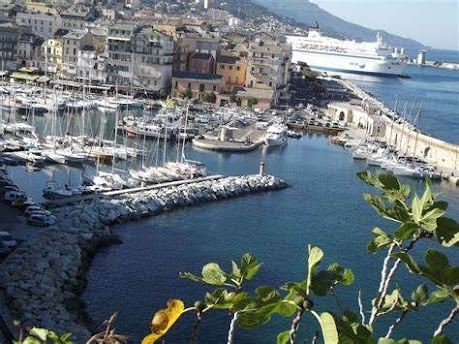"Victory belongs to the most persevering."
-- Napoleon Bonaparte=====================================================================
(on Corsica). The port city of Bastia (shown here) opens its arms to weary travelers disembarking from a long ferry trip. For a truly charming Corsican experience, catch a train through the mountains to the beach, passing by rustic villages and grazing cows along the way.
+ Jutting from the foaming Mediterranean like an impregnable fortress, Corsica resembles a miniature continent, with astounding geographical diversity. Within half an hour's drive, the landscape ranges from glittering bays, vibrant coastal cities, and fabulous beaches to sawtooth mountain ridges, verdant valleys, dense forests, and time-forgotten hilltop villages.
+ Compared to the Mediterranean islands that belong to Spain and Greece, Corsica is among the larger islands in the Mediterranean Sea and is located north of Italy's Sardinia. Despite its distance from Paris, Corsica has significantly impacted France's national and international affairs because French emperor Napoleon Bonaparte was born in Corsica's coastal city, Ajaccio, in 1769. Ajaccio is quite intriguing for history buffs as visitors to the city can see his childhood home, the massive Palais Fesch art museum. It features paintings from the personal collection of Bonaparte's uncle, busts of the family, and a statue of Bonaparte at Place d'Austerlitz.
+ The island of Corsica, is one of the 18 regions of France. It is the fourth-largest island in the Mediterranean and lies southeast of the French mainland, west of the Italian Peninsula and immediately north of the Italian island of Sardinia, the nearest land mass. (A single chain of mountains makes up two-thirds of the island) Bastia and Ajaccio, on the coast, are the largest towns and home to about half of the island’s population. In the early 21st century some four-fifths of Corsica’s population was urban. In northern Corsica the Balagne (once called the “Garden of Corsica”) is also densely populated. The regional capital is Ajaccio. Although the region is divided into two administrative departments, Haute-Corse and Corse-du-Sud, their respective regional and departmental territorial collectivities were merged on 1 January 2018 to form the single territorial collectivity of Corsica.
+ Corsica was ruled by the Republic of Genoa from 1284 to 1755, when it seceded to become a self-proclaimed, Italian-speaking Republic. In 1768, Genoa officially ceded it to Louis XV of France as part of a pledge for the debts incurred after enlisting French military help in suppressing the Corsican revolt; as a result, France annexed the island in 1769. The future Emperor of the French, Napoleon Bonaparte, was a native Corsican, born that same year in Ajaccio: his ancestral home, Maison Bonaparte, is now a visitor attraction and museum. Because of Corsica's historical ties to Tuscany, the island has retained many Italian cultural elements, and many Corsican surnames are rooted in the Italian peninsula.
+ Jutting from the foaming Mediterranean like an impregnable fortress, Corsica resembles a miniature continent, with astounding geographical diversity. Within half an hour's drive, the landscape ranges from glittering bays, vibrant coastal cities, and fabulous beaches to sawtooth mountain ridges, verdant valleys, dense forests, and time-forgotten hilltop villages.
+ Compared to the Mediterranean islands that belong to Spain and Greece, Corsica is among the larger islands in the Mediterranean Sea and is located north of Italy's Sardinia. Despite its distance from Paris, Corsica has significantly impacted France's national and international affairs because French emperor Napoleon Bonaparte was born in Corsica's coastal city, Ajaccio, in 1769. Ajaccio is quite intriguing for history buffs as visitors to the city can see his childhood home, the massive Palais Fesch art museum. It features paintings from the personal collection of Bonaparte's uncle, busts of the family, and a statue of Bonaparte at Place d'Austerlitz.
+ The island of Corsica, is one of the 18 regions of France. It is the fourth-largest island in the Mediterranean and lies southeast of the French mainland, west of the Italian Peninsula and immediately north of the Italian island of Sardinia, the nearest land mass. (A single chain of mountains makes up two-thirds of the island) Bastia and Ajaccio, on the coast, are the largest towns and home to about half of the island’s population. In the early 21st century some four-fifths of Corsica’s population was urban. In northern Corsica the Balagne (once called the “Garden of Corsica”) is also densely populated. The regional capital is Ajaccio. Although the region is divided into two administrative departments, Haute-Corse and Corse-du-Sud, their respective regional and departmental territorial collectivities were merged on 1 January 2018 to form the single territorial collectivity of Corsica.
+ Corsica was ruled by the Republic of Genoa from 1284 to 1755, when it seceded to become a self-proclaimed, Italian-speaking Republic. In 1768, Genoa officially ceded it to Louis XV of France as part of a pledge for the debts incurred after enlisting French military help in suppressing the Corsican revolt; as a result, France annexed the island in 1769. The future Emperor of the French, Napoleon Bonaparte, was a native Corsican, born that same year in Ajaccio: his ancestral home, Maison Bonaparte, is now a visitor attraction and museum. Because of Corsica's historical ties to Tuscany, the island has retained many Italian cultural elements, and many Corsican surnames are rooted in the Italian peninsula.





No comments:
Post a Comment